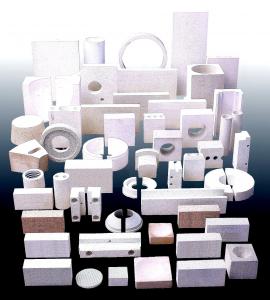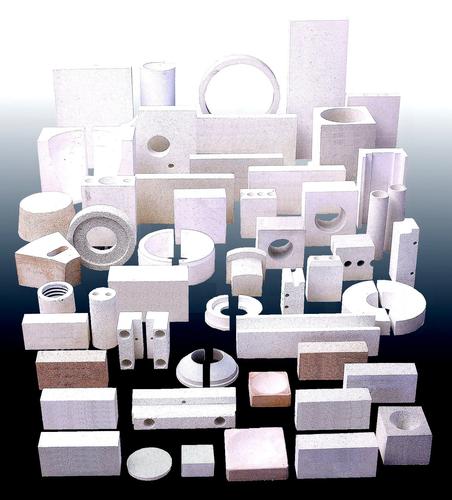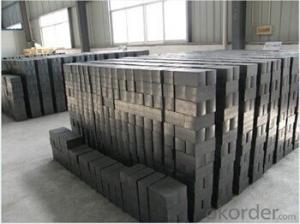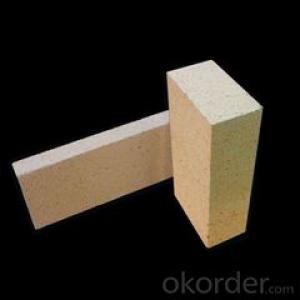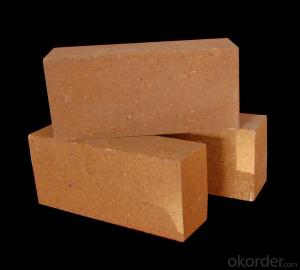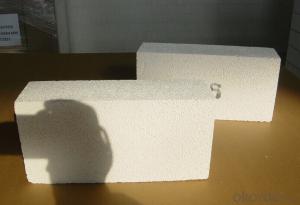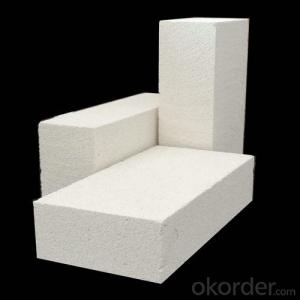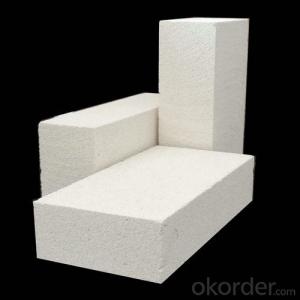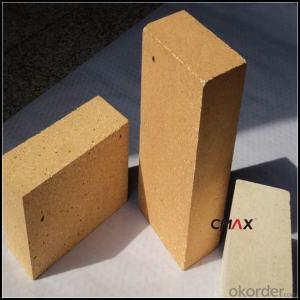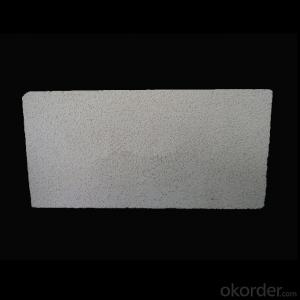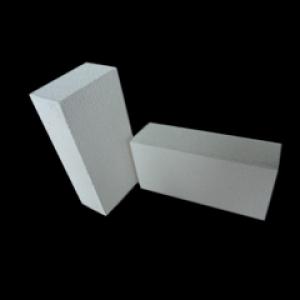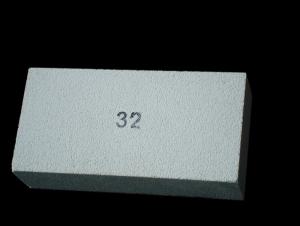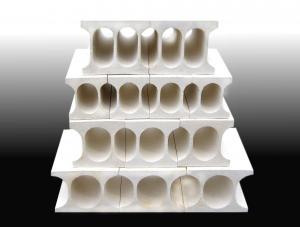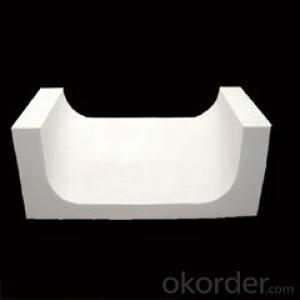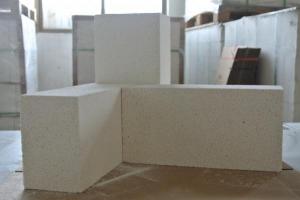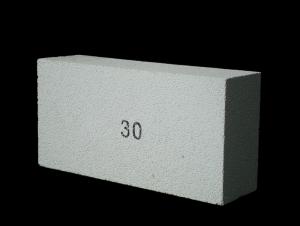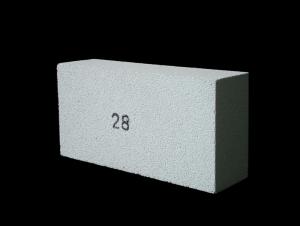Insulating Fire Brick - High-Quality Insulation for Fire Safety
- Loading Port:
- China Main Port
- Payment Terms:
- TT OR LC
- Min Order Qty:
- -
- Supply Capability:
- -
OKorder Service Pledge
Quality Product, Order Online Tracking, Timely Delivery
OKorder Financial Service
Credit Rating, Credit Services, Credit Purchasing
You Might Also Like
General Information
CMAX insulating firebricks are classified under temperature between 1300℃ to 1700℃, manufactured from high purity alumina clay.
Feature
Light weight and low thermal conductivity
Low heat storage
Low iron and impurities
High thermal shock resistance
Application
CMAX insulating firebricks can be used as a hot face lining directly exposed to the heat or as a backup insulation layer in iron and steel mills, non-ferrous foundries, petrochemical, ceramic, glass.
- Q: Can insulating fire bricks be used in the construction of BBQ pits?
- Indeed, the utilization of insulating fire bricks is feasible for the construction of BBQ pits. These bricks are specifically engineered to endure extreme temperatures and possess exceptional heat resistance attributes, rendering them perfectly suited for BBQ pit applications. By incorporating these bricks, heat is effectively captured and evenly dispersed, leading to improved cooking efficiency and a more enjoyable BBQ experience. Moreover, the inclusion of insulating fire bricks aids in minimizing heat dissipation, guaranteeing that the BBQ pit retains and sustains heat for an extended duration. All in all, the integration of insulating fire bricks significantly enhances the overall performance and longevity of the BBQ pit.
- Q: Can insulating fire bricks be used in fertilizer plants?
- Yes, insulating fire bricks can be used in fertilizer plants. Insulating fire bricks are known for their excellent thermal insulation properties, high heat resistance, and low thermal conductivity. These properties make them suitable for various industrial applications, including fertilizer plants. In fertilizer plants, there are often processes that involve high temperatures, such as the production of ammonia or the conversion of raw materials into fertilizers. Insulating fire bricks can be used to line the walls, floors, and roofs of the furnaces, kilns, and reactors used in these processes. The thermal insulation provided by insulating fire bricks helps to minimize heat loss, increase energy efficiency, and maintain a stable temperature inside the processing units. This is crucial for controlling the chemical reactions and ensuring the optimal performance of the plant. Additionally, insulating fire bricks have a high resistance to chemical attack, which is essential in fertilizer plants where corrosive substances are often handled. They can withstand the harsh chemicals and gases present in the production environment without deteriorating or compromising their insulating capabilities. Furthermore, insulating fire bricks are lightweight, making them easier to handle and install in different areas of the plant. This can result in cost savings during construction or maintenance activities. Overall, insulating fire bricks are a suitable choice for fertilizer plants due to their thermal insulation properties, high heat resistance, chemical resistance, and lightweight nature. They can contribute to the efficient and safe operation of the plant, while also providing long-lasting performance in the demanding conditions of the fertilizer industry.
- Q: Can insulating fire bricks be used in the construction of refractory linings?
- Yes, insulating fire bricks can be used in the construction of refractory linings. Insulating fire bricks are specifically designed to have excellent thermal insulation properties, making them ideal for applications where high temperatures need to be contained. They are commonly used in the construction of furnaces, kilns, and other high-temperature environments. The insulating properties of these bricks help to reduce heat loss, improve energy efficiency, and maintain a stable temperature within the refractory lining. Additionally, insulating fire bricks are lightweight and easy to handle, making them a practical choice for refractory lining construction.
- Q: Are insulating fire bricks eco-friendly?
- Insulating fire bricks can be considered eco-friendly to some extent. These bricks are typically made from natural materials such as clay, shale, and other fire-resistant minerals, which are abundant and readily available. The production process involves firing the bricks at high temperatures, which can be energy-intensive, but modern manufacturing techniques have reduced the environmental impact by using more efficient kilns and recycled materials. Moreover, insulating fire bricks have a long lifespan and can withstand high temperatures, which means they require less frequent replacement compared to other types of bricks. This leads to a reduction in waste generation and resource consumption over time. Additionally, these bricks have excellent thermal insulation properties, which can help reduce energy consumption in various applications. By minimizing heat loss, insulating fire bricks can contribute to energy efficiency and lower carbon emissions in buildings and industrial processes. However, it is important to note that the eco-friendliness of insulating fire bricks also depends on their proper disposal at the end of their lifespan. If they are not recycled or disposed of properly, they can contribute to landfill waste and potential environmental pollution. In conclusion, while insulating fire bricks have certain eco-friendly attributes such as being made from natural materials and their energy-saving properties, their overall environmental impact also relies on responsible manufacturing, use, and disposal practices.
- Q: Are insulating fire bricks suitable for use in kilns?
- Yes, insulating fire bricks are suitable for use in kilns. Insulating fire bricks are specifically designed to withstand high temperatures and provide excellent insulation properties. They are made from lightweight materials that have low thermal conductivity, allowing them to retain heat efficiently and reduce heat loss. This makes them ideal for lining kilns as they help to maintain consistent and controlled temperatures, improving energy efficiency and reducing fuel consumption. Additionally, insulating fire bricks have good resistance to thermal shock, meaning they can withstand rapid and extreme temperature changes without cracking or breaking. Overall, insulating fire bricks are a reliable and effective choice for kiln linings, ensuring optimal performance and prolonging the lifespan of the kiln.
- Q: Do insulating fire bricks require a protective coating for outdoor use?
- Insulating fire bricks have been specifically engineered to endure high temperatures and offer thermal insulation. While they are commonly applied indoors, such as in kilns, furnaces, and fireplaces, they can also be utilized outside. However, the necessity of a protective coating for outdoor use relies on the specific circumstances and environment in which they will be employed. Generally, insulating fire bricks are composed of materials like clay or alumina silicate, which possess inherent resistance to weathering and environmental factors. They can tolerate exposure to rain, snow, and even extreme temperatures without significant deterioration. These bricks are often classified as refractory materials due to their heat resistance, rendering them highly durable in outdoor settings. Nonetheless, there may be instances where it is advisable to apply a protective coating to the insulating fire bricks for additional protection. For example, if the bricks will be continually exposed to harsh weather conditions, prolonged UV radiation, or corrosive substances, a protective coating can enhance their longevity. The selection of coating will depend on the specific requirements and anticipated conditions. Various options are available, such as high-temperature paint, ceramic coatings, or silicone-based sealants. These coatings can furnish an additional layer of safeguarding against moisture, chemicals, and temperature fluctuations, ensuring the bricks retain their insulation properties and structural integrity over time. In conclusion, insulating fire bricks are generally suitable for outdoor use without necessitating a protective coating, as they are specifically designed to withstand high temperatures and adverse weather conditions. However, if the bricks will be exposed to particularly harsh or corrosive environments, applying an appropriate protective coating can offer additional durability and ensure their longevity. It is always recommended to seek guidance from experts or manufacturers for specific advice based on the intended use and outdoor conditions.
- Q: What are the sizes of lightweight thermal insulation bricks?
- Low iron mullite, high aluminum light insulating refractory brick, diatomite insulating refractory brick. Sizes can be customized for ordinary profiled sizes
- Q: Can insulating fire bricks be used in the construction of ceramic fiber-lined kilns?
- Yes, insulating fire bricks can be used in the construction of ceramic fiber-lined kilns. Insulating fire bricks are designed to provide excellent insulation and can help increase the energy efficiency of the kiln. By using insulating fire bricks, the kiln can reach and maintain higher temperatures while minimizing heat loss through the walls.
- Q: Can insulating fire bricks be used in the construction of brick kilns?
- Insulating fire bricks are capable of being utilized in the construction of brick kilns. Designed specifically with high thermal resistance, these bricks are well-suited for scenarios requiring insulation. Within brick kilns, insulating fire bricks may be employed to line the walls, floor, and roof of the kiln, effectively maintaining heat and enhancing energy efficiency. These bricks possess the ability to withstand elevated temperatures, providing insulation against the heat generated throughout the firing process. Furthermore, they aid in reducing heat loss, resulting in quicker and more efficient firing cycles. In conclusion, incorporating insulating fire bricks into the construction of brick kilns can elevate their performance and contribute to a more effective and sustainable operation.
- Q: What are the insulation materials for heating buried pipelines?
- Heating pipe insulation material should be heat-resistant, flame retardant, small thermal conductivity, low moisture absorption, no corrosion. In order to enhance the mechanical strength of the general production into a massive, commonly used rock wool pipe shell; superfine glass wool pipe shell, polyurethane foam pad pad; perlite insulation materials.
Send your message to us
Insulating Fire Brick - High-Quality Insulation for Fire Safety
- Loading Port:
- China Main Port
- Payment Terms:
- TT OR LC
- Min Order Qty:
- -
- Supply Capability:
- -
OKorder Service Pledge
Quality Product, Order Online Tracking, Timely Delivery
OKorder Financial Service
Credit Rating, Credit Services, Credit Purchasing
Similar products
Hot products
Hot Searches
Related keywords
